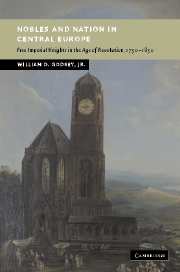Book contents
- Frontmatter
- Contents
- Preface
- Abbreviations
- Introduction
- 1 Wealth and noble autonomy: the Free Imperial Knights in Mainz on the eve of revolution
- 2 Nobles becoming Germans: the transformation of a concept
- 3 Nobles becoming Germans: the destruction of a “geo-cultural landscape”
- 4 Between destruction and survival: knights on the Middle Rhine 1750–1850
- 5 The past recaptured: knights in the Hapsburg Empire 1792–1848
- 6 From cathedral canons to priests: the Coudenhoves and the “Catholic revival”
- 7 The beginnings of conservative German nationalism: the “naturalization” of Baron Carl vom und zum Stein (1757–1831)
- Conclusion
- Appendix: Families of Free Imperial Knights (1797)
- Bibliography
- Index
3 - Nobles becoming Germans: the destruction of a “geo-cultural landscape”
Published online by Cambridge University Press: 01 October 2009
- Frontmatter
- Contents
- Preface
- Abbreviations
- Introduction
- 1 Wealth and noble autonomy: the Free Imperial Knights in Mainz on the eve of revolution
- 2 Nobles becoming Germans: the transformation of a concept
- 3 Nobles becoming Germans: the destruction of a “geo-cultural landscape”
- 4 Between destruction and survival: knights on the Middle Rhine 1750–1850
- 5 The past recaptured: knights in the Hapsburg Empire 1792–1848
- 6 From cathedral canons to priests: the Coudenhoves and the “Catholic revival”
- 7 The beginnings of conservative German nationalism: the “naturalization” of Baron Carl vom und zum Stein (1757–1831)
- Conclusion
- Appendix: Families of Free Imperial Knights (1797)
- Bibliography
- Index
Summary
“In the house of my parents … I grew up influenced by my birth into the high nobility (reichsständische Geburt), by the position of my father in imperial service, by French social life, and by the moral listlessness that characterized the small German states before the storm that would soon destroy them.”
Prince Clemens Metternich-Winneburg, “Autobiographische Denkschrift,” in: N.P. 1, 7.“Dalberg was no German patriot.”
Rainer Wohlfeil, “Untersuchungen zur Geschichte des Rheinbundes 1806–1813. Das Verhältnis Dalbergs zu Napoleon,” Zeitschrift für die Geschichte des Oberrheins 108 (1960): 106.Until long after the destruction of virulent German nationalism in the Second World War, the sometime Prince-Primate Baron Carl Dalberg (1744–1817) presented historians in Germany with a most problematic figure. Descended from an illustrious family of Free Imperial Knights, Dalberg not only allied himself with the French, in his capacity as the last surviving ecclesiastical prince, but committed the unforgivable sin of not turning against them during the so-called “War of Liberation.” He instead gave up the throne created for him by Napoleon and retired from politics. Both contemporary and later judgments of Dalberg have mostly ranged from the condemnatory to the merely embarrassed. His life was certainly difficult to reconcile with national chauvinism, which in turn dictated both the tone and the substance of the ruling interpretation of history. The rejection of Dalberg reached a climax in the decades around 1900, when he was damned as a traitor. At best, he appeared “less than laudable in the eyes of a patriot”.
- Type
- Chapter
- Information
- Nobles and Nation in Central EuropeFree Imperial Knights in the Age of Revolution, 1750–1850, pp. 72 - 105Publisher: Cambridge University PressPrint publication year: 2004

